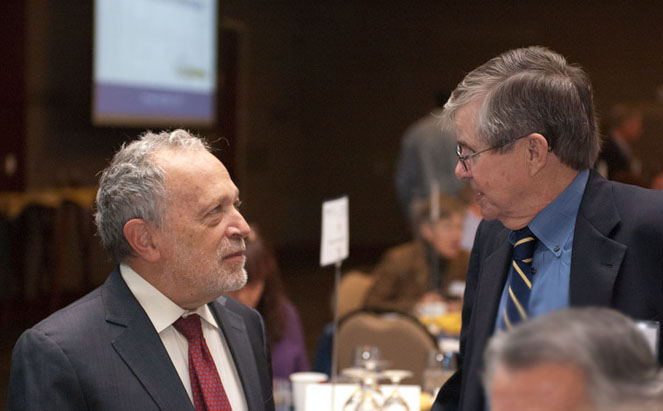
On a morning front-loaded with data and forecasts, Robert B. Reich stepped aside from slide presentations and peered behind the veil of business cycle theory to deliver a message about a different set of fundamentals.
America is a practical nation and has always found a way to expand prosperity.
“I’m optimistic because of American history,” Reich said after his keynote presentation at the Economic Outlook Conference at Northern Arizona University on Thursday. “We continue to reform capitalism when the excesses of capitalism threaten the system. We’ve done it at least three times in the last 100 years, and we’ll do it again.”
The former Secretary of Labor didn’t scrimp on detail to support his views during a well-received talk to an audience that had just heard two hours of outlooks ranging from bleak to mildly optimistic.
Reich, Chancellor’s Professor of Public Policy at the University of California, Berkeley, engagingly wove fact and persuasion into an argument that stagnant wages for the middle class, and an unprecedented concentration of wealth, explain much of the economy’s slow growth. The themes are familiar from his books, blogs and interviews, and more recently in the documentary Inequality for All.
|
“Median household incomes continue to drop, but the economy is twice as large as it was in the 1970s,” Reich said. “Where did all that money go?” He quickly followed the rhetorical question by acknowledging that some see his views as class warfare. “I’m not a class warrior,” he said. “I’m a class worrier. When the middle class is stressed, it’s an economic problem.”
In discussing the effects of globalization and technological change, Reich pointed out “if you have the right skills, globalization and technology can be your friends.” He labeled as fallacy a common argument about low wages, saying that the issue is not simply what workers are being paid in other countries. “Wage isn’t the only determinant in where things are made,” he said, using the example of his artificial hips, which were precision manufactured in Germany, to emphasize the concept of value added.
“The choice in the U.S. is whether we have jobs adding value or lousy jobs,” Reich said.
To vocal approval, Reich pressed a call for more investment in higher education, saying a skilled American workforce that can add value is a key component in wage growth.
“We need to lead the conversation that higher education is not a private investment but a public good,” Reich said in response to an audience question, after having earlier said the community colleges were the “unsung heroes” in education today. “Over the next 30 years, the gains will go to those who have the right education, skills and connections.”
Reich identified education as one of the pillars of public investment in the 1950s, along with infrastructure, that accompanied a booming economy. Looking ahead, he said “we will do fine to the extent that we continue to invest wisely in education” from preschool to college. “Then we will have a workforce capable of generating higher and higher value.”
Turning to demographics, Reich said another factor in that period of growth now looms as a liability. The first wave of the Baby Boomer generation is “hitting the shores of retirement, and there’s no way they can afford it,” he said. And as 77 million bodies corrode, “repair work will be demanded and expected.”
Setting aside budget deficits and Social Security solvency as threats, calling the latter “a problem, but not that big of a problem,” Reich pointed to Medicare as “the big bear of a problem.” The solution is finding a way to switch from fee for service to fee for healthy outcomes, he said.
Many of the points Reich made at the conference reinforce the feature-length line of reasoning in his documentary, which is showing in theaters around the country. Reich said he has been “blown away” by the reception, and that he has a “steadily growing pile of requests” from universities and high schools to view it. The film is even drawing audiences in so-called Red States.
“That’s the big surprise,” Reich said. “I didn’t know there was much eagerness to understand what was going on.”
Yet Reich said increased public awareness must be part of any large-scale change.
“That’s why I made the film, and write and teach,” Reich said. “If the public doesn’t understand what’s happening and why, then how can we expect the public to make wise decisions when it comes time to vote?” Even in a time of political polarization, he said a “roll up our sleeves” attitude would eventually prevail. “We don’t dwell in ideology when we understand the problem.”



